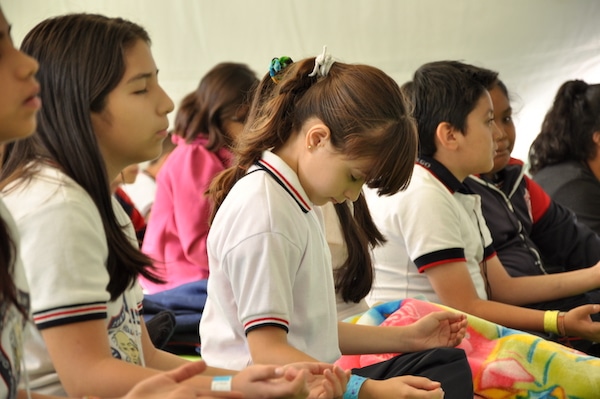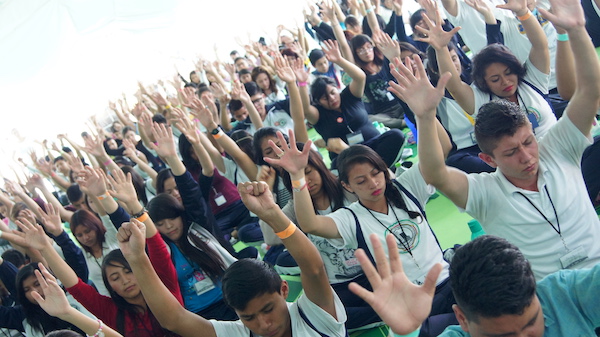July 2020
Recently, researchers at Yale University and Beth Israel Deaconess Medical Center (BIDMC) have independently published research findings stating the efficacy of Gurudev Sri Sri Ravi Shankar’s Sudarshan Kriya Yoga (SKY) technique as a stress management tool.
While Yale found that the SKY Campus Happiness Retreat reduced stress and depression and showed improvements in six key areas, BIDMC found that it “improved participants’ ability to cope with stress, as measured by both self-report and heart rate data.”

Study summaries
The Yale study
In a randomized controlled trial of 135 undergraduate students, the research teams at the Yale Child Study Center and the Yale Center for Emotional Intelligence (YCEI) evaluated three classroom-based wellness training programs for eight weeks (30 hours) and measured results against those of a non-intervention control group.
The researchers said: “Compared to the control group,” students who practiced breathwork like the Sudarshan Kriya and other diaphragmatic breathing tools and engaged in service initiatives as part of the resilience training workshops of the Art of Living, “showed the greatest impact, benefiting six outcomes:
- Depression
- Stress
- Mental health
- Mindfulness
- Positive affect
- Social connectedness
- A participant in the SKY program, Anna Wilkinson ’22 B.A., said she was not familiar with the positive benefits of breathing exercises before the training, but now uses the technique regularly. “I didn’t realize how much of it was physiology, how you control the things inside you with breathing,” Wilkinson said. “I come out of breathing and meditation as a happier, more balanced person, which is something I did not expect at all.”
- Another participant of the SKY Campus Happiness program, Davornne Lindo ’22 B.A., a member of the Yale track team, said the practice of breathing techniques helped her to manage stress from both academics and athletics. “Now that I have these techniques to help me, I would say that my mentality is a lot healthier,” Lindo said. “I can devote time to studying and not melting down. Races have gone better. Times are dropping.”
The BIDMC study
In a randomized controlled trial of two life skills workshops designed to teach university students to cope with stress, the researchers found that the program that focused on yogic breathing—a meditative practice that involves slow and fast patterns of breath—improved participants’ ability to cope with stress, as measured by both self-report and heart rate data, compared to a workshop that focused on cognitive approaches to stress. The findings appear in the Journal of American College Health.
A valuable tool to build resiliency
The Yale findings, reported in Frontiers in Psychiatry and mentioned on the Yale University website, said ‘such resiliency training programs could be a valuable tool for addressing the mental health crisis on university campuses.’
“In addition to academic skills, we need to teach students how to live a balanced life,” said Emma Seppälä, lead author and faculty director of the Women’s Leadership Program at Yale School of Management. “Student mental health has been on the decline over the last 10 years.”
The researchers said that such resiliency training tools can address the overburdening of campus counseling centers directly. “Students learn tools they can use for the rest of their lives to continue to improve and maintain their mental health,” said co-first author Christina Bradley ’16 B.S., currently a Ph.D. student at the University of Michigan.
Says Michael R. Goldstein, PhD, Research Fellow in the Department of Neurology at BIDMC who led the second research: “We investigated the effects of two wellness workshops with contrasting approaches to stress management, and while both were popular with participants, the one that incorporated yogic breathing demonstrated benefits that were stronger, longer-lasting, and evident across more measures of wellness than the cognitive comparison workshop.”
How does breathing relate to stress-relief and happiness?
Breathing helps mental well-being by activating the vagus nerve which influences the human mind and body, including:
- The brain
- Depression and anxiety
- Digestive juice secretion in the gut
- Heart rate variability
- Blood glucose balance
- Bile production
- Kidney function
- Fertility in women
- Taste and saliva
- A sense of connectedness
- Mental and physical well-being
- Altruistic behavior
Stimulation of the vagus nerve is directly linked to your wellness. The better your vagal tone, you are happier and healthier. Any practice that aids the stimulation of the vagus nerve, improves the body-mind connection since the vagus nerve is the physical representation of the link between body and mind.
Simple techniques like deeper diaphragmatic breathing or Sudarshan Kriya Yoga have been found to activate the vagus nerve.
More about SKY
Sudarshan Kriya is a powerful rhythmic breathing practice that eliminates stress and emotional toxins at a cellular level.

Research shows the technique helps improve the sleep cycle, improves secretion of happy or feel-good hormones like oxytocin, and reduces the secretion of stress hormones like cortisol. This leads to better sleep, more retentive power, and heightened awareness.

